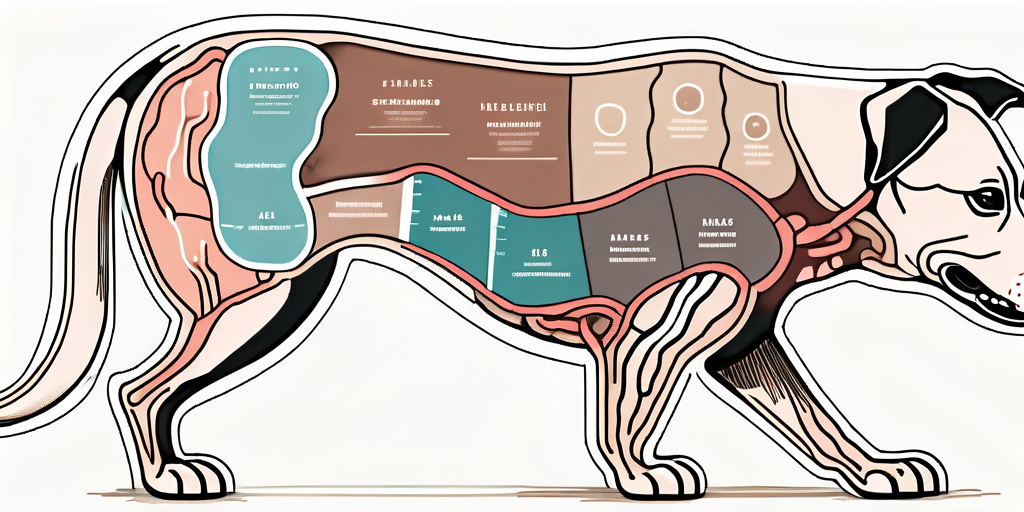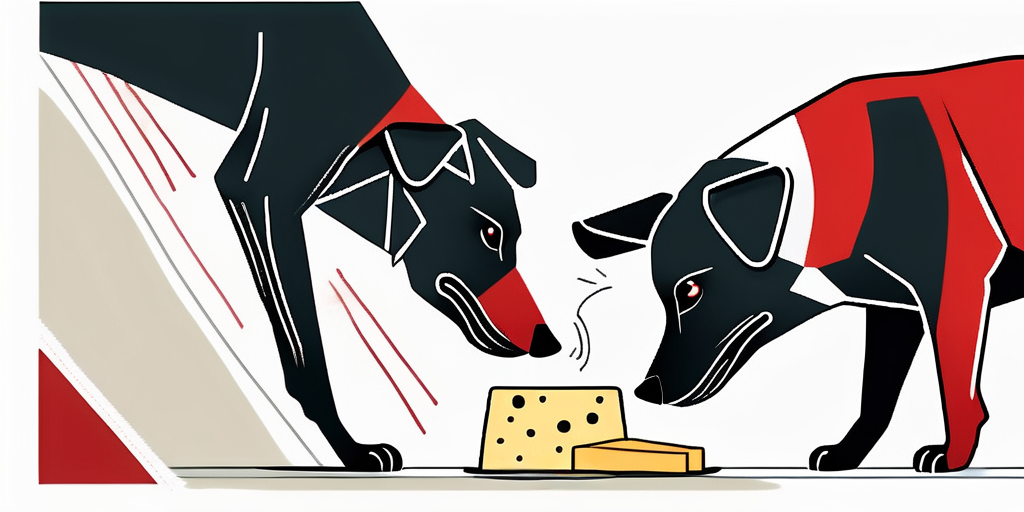Understanding the Canine Digestive System
Dogs have a unique digestive system that differs from humans. While humans are able to digest and process dairy products, such as cheese, dogs may not have the same ability. It’s important to understand the basics of a dog’s diet and how they process different foods.

The Basics of a Dog’s Diet
A dog’s diet primarily consists of protein from animal sources, such as meat, poultry, and fish. They also require carbohydrates for energy and essential vitamins and minerals for overall health. A balanced diet ensures that dogs receive all the nutrients they need to thrive.
How Dogs Process Dairy Products
Dogs produce less lactase, the enzyme responsible for breaking down lactose found in dairy products, as they mature. This means that their ability to digest lactose decreases over time. When dogs consume dairy products like cheese, their bodies may have difficulty processing the lactose, resulting in gastrointestinal issues such as diarrhea or vomiting.
However, it’s important to note that not all dogs are lactose intolerant. Some dogs may still be able to tolerate small amounts of dairy without experiencing any adverse effects. This is because the amount of lactase produced can vary between individual dogs. If you’re unsure whether your dog can handle dairy, it’s best to consult with your veterinarian.
In addition to lactose, dogs also have different digestive enzymes compared to humans. For example, dogs have an enzyme called amylase in their saliva, which helps break down carbohydrates. Humans, on the other hand, produce amylase primarily in their pancreas. This difference in enzyme production highlights the unique adaptations of a dog’s digestive system to their specific dietary needs.
The Nutritional Value of Cheese
While cheese is a good source of calcium and protein for humans, its nutritional value for dogs is not as beneficial. Different types of cheese have varying nutrient profiles that may offer some health benefits to dogs.

Types of Cheese and Their Nutrients
Cheeses like cheddar, mozzarella, and cottage cheese are commonly available and may be given to dogs in moderation. They provide protein and essential amino acids that support muscle growth and repair. However, it’s important to consider the fat content of these cheeses, as excessive fat consumption can lead to weight gain and other health issues.
Potential Health Benefits for Dogs
In moderation, cheese can be a tasty treat for dogs. The high protein content supports their overall health and muscle development. Additionally, cheese contains vitamins, such as vitamin B12 and vitamin A, which contribute to a dog’s overall wellness. However, the potential benefits should be weighed against the risks associated with feeding cheese to dogs.
It’s worth noting that not all dogs tolerate cheese well. Some dogs may be lactose intolerant, which means they lack the necessary enzyme to break down lactose, the sugar found in milk products. Feeding cheese to lactose-intolerant dogs can lead to digestive issues such as diarrhea, gas, and stomach discomfort.
Furthermore, while cheese can provide some nutritional benefits, it should never be the sole source of a dog’s diet. Dogs require a balanced diet that includes a variety of nutrients from different food sources. Relying heavily on cheese as a dietary staple can lead to imbalances and deficiencies in other essential nutrients.
Risks Associated with Feeding Cheese to Dogs
Although cheese may offer some health benefits, there are certain risks associated with feeding it to dogs. It’s important to be aware of these potential risks to make informed decisions regarding your dog’s diet.

Lactose Intolerance in Dogs
As mentioned earlier, dogs may have difficulty digesting lactose due to a decrease in lactase production. This lactose intolerance can cause digestive upset, including gas, bloating, and diarrhea. If your dog is lactose intolerant, feeding them cheese or other dairy products can exacerbate these symptoms.
High Fat Content and Weight Gain
Cheese tends to be high in fat, which can lead to weight gain if not portioned and incorporated into a balanced diet. Obesity in dogs can contribute to various health issues, such as joint problems, diabetes, and heart disease. It’s important to consider the fat content and calorie density of cheese when feeding it to your dog.
Potential for Allergic Reactions
Some dogs may be allergic or sensitive to dairy products, including cheese. Allergic reactions can manifest as skin irritations, itching, or gastrointestinal distress. If you notice any adverse reactions after feeding your dog cheese, it’s best to consult with your veterinarian and explore alternative options.
While these risks are important to consider, it’s worth noting that not all dogs will experience negative effects from consuming cheese. In fact, some dogs may tolerate cheese well and even benefit from its nutritional value. However, it’s crucial to monitor your dog’s reaction and consult with a veterinarian before making cheese a regular part of their diet.
Furthermore, it’s essential to choose the right type of cheese for your dog. Some cheeses, such as cheddar or Swiss, are lower in lactose compared to others. Additionally, opting for low-fat or reduced-fat varieties can help mitigate the risk of weight gain. Always read the labels and choose cheese options that align with your dog’s specific dietary needs.
In conclusion, while cheese can be a tasty treat for dogs, it’s important to be aware of the potential risks associated with feeding it to them. Understanding your dog’s individual needs, such as lactose tolerance and weight management, can help you make informed decisions about incorporating cheese into their diet. Remember to consult with your veterinarian if you have any concerns or questions regarding your dog’s nutrition.
Safe Cheese Consumption for Dogs
If you decide to feed cheese to your dog, it’s essential to do so in a safe and responsible manner. Consider the following guidelines to ensure your dog can enjoy cheese without experiencing any negative effects.
Choosing the Right Cheese for Your Dog
When selecting cheese for your dog, opt for low-fat and low-sodium options. This not only helps to prevent weight gain and potential health issues but also reduces the risk of digestive problems. Choose cheeses like cottage cheese or mozzarella, which have lower fat content compared to cheddar or Swiss. These options are not only healthier but also easier for your dog to digest.
Additionally, it’s important to look for cheeses without added seasonings or flavorings that may be harmful to dogs. Some cheeses, such as those with garlic or onion flavorings, can be toxic to dogs and should be avoided. Stick to plain, natural cheeses to ensure the safety of your furry friend.
Portion Control and Frequency
Ensure that cheese is given to your dog in moderation. While cheese can be a tasty treat, it should not replace a balanced diet. Limit the portion sizes to small amounts and incorporate them into your dog’s daily calorie intake. This will help prevent weight gain and maintain a healthy body condition for your dog.
It’s also important to consider the frequency of cheese consumption. While it may be tempting to spoil your dog with cheese every day, it’s best to use it as an occasional treat. Too much cheese can lead to an upset stomach, diarrhea, or even pancreatitis in some dogs. So, be mindful of how often you offer cheese to your furry companion.
Remember, cheese should never be the main component of your dog’s diet. It should be given as an occasional reward or used as a training treat. Always consult with your veterinarian before introducing any new food into your dog’s diet, especially if they have any underlying health conditions or dietary restrictions.
Alternatives to Cheese for Dogs
If you are concerned about the potential risks or if your dog has dietary restrictions, there are several healthy alternatives to cheese that you can offer as treats.
Healthy Treat Options
Consider giving your dog fresh fruits and vegetables as healthy alternatives to cheese. Options such as carrots, green beans, and apples can be a great source of vitamins and fiber for your furry friend. Not only do these treats provide essential nutrients, but they also offer a satisfying crunch that dogs love. Just make sure to cut them into appropriate sizes to prevent choking hazards.
When it comes to fruits, it’s important to note that not all of them are safe for dogs. Grapes and raisins, for example, can be toxic and should be avoided. On the other hand, blueberries and strawberries are not only safe but also packed with antioxidants that can benefit your dog’s overall health.
Dairy-Free Alternatives
If your dog is lactose intolerant or allergic to dairy, there are dairy-free alternatives available. Look for lactose-free cheeses specifically made for dogs, or consider offering them non-dairy treats that are safe and nutritious. Some dogs may enjoy a dollop of unsweetened yogurt, which provides probiotics that can aid in digestion. Always read the labels and consult with your veterinarian if you’re unsure about the suitability of certain products for your dog.
Another dairy-free option to consider is peanut butter. Not only is it a tasty treat that most dogs go crazy for, but it also contains healthy fats and protein. However, be sure to choose a peanut butter that does not contain xylitol, a sweetener that is toxic to dogs.
In conclusion, while some dogs may tolerate cheese in moderation, it’s important to understand their digestive system and the potential risks associated with feeding them dairy products. Make informed decisions about your dog’s diet, ensuring that cheese or any treats are given in appropriate portions and frequency. Consider healthy alternatives when necessary, and always consult with your veterinarian for personalized advice regarding your dog’s nutritional needs.
